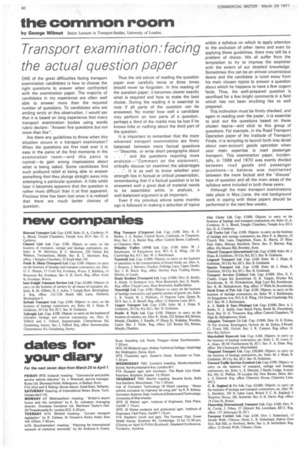the common room
Page 62

If you've noticed an error in this article please click here to report it so we can fix it.
by George Wilmot Senior Lecturer in Transport Studies, University of London.
Transport examination:facing the actual question paper
ONE of the great difficulties facing transport examination candidates is how to choose the right questions to answer when confronted with the examination paper. The majority of candidates in my experience are often well able to answer more than the required number of questions. To candidates who are smiling wryly at this observation. I would say that it is based on long experience that many transport examination bodies using words rubric declare: "Answer five questions but not more than five".
Are there any guidelines to throw when this situation occurs in a transport examination? When the questions are first read over it is easy in the panic of the first moments in the examination room-and this panic is normal-to gain wrong impressions about what is being asked. Some candidates find such profound relief at being able to answer something that they plunge straight away into attempting a particular question. A little while later it becomes apparent that the question is rather more difficult than it at first appeared. Precious time has been lost once it is realized that there are much better choices of question. Thus the old advice of reading the question paper over carefully twice or three times should never be forgotten. In this reading of the question paper, it becomes clearer exactly what is required and how to make the best choice. During the reading it is essential to note if all parts of the question can be answered. No matter how well a candidate may perform on two parts of a question, perhaps a third of the marks may be lost if he knows little or nothing about the third part of the question.
It is important to remember that the more advanced transport examinations are finely balanced between more factual questions -"Describe, or write short paragraphs about . . ." and the questions requiring more analysis-"Comment on the statement, critically discuss (or examine) the advantages . . .". It is as well to know whether your strength lies in factual or critical presentation, remembering that if a factual question is to be answered well a great deal of material needs to be assembled while, in analysis, a well-balanced argument is all important.
Even if my previous advice some months ago is followed in makinya selection of topics within a syllabus on which to apply attention to the exclusion of other items and even by applying these guidelines, there may still be a problem of choice. We all suffer from the temptation to try to impress the examiner with the extent of our detailed knowledge. Sometimes this can be an almost unconscious desire and the candidate is lured away from his main chosen topics to answer a question about which he happens to have a few cogent facts. Thus, the well-prepared question is sacrificed for a few bright comments in a field which has not been anything like as well prepared.
This inclination must be firmly checked, and again in reading over the paper, it is essential to pick out the questions based on these chosen topics and stick to this group of questions. For example, in the Road Transport Operation paper of the Institute of Transport Finals, it is tempting to launch forth into detail about own-account goods operation when your main expertise is road passenger transport. This examination paper, incidentally, in 1969 and 1970 was evenly divided between road goods and passenger questions-a balance was maintained between the more factual and the "discuss" type of question and all the main areas of the syllabus were included in both these years.
Although the main transport examinations take place in May /June, the real background work in coping with these papers should be performed in the next few weeks.














































































































